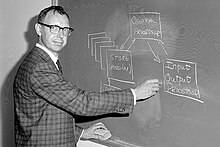American computer scientist, engineer and social critic From Wikipedia, the free encyclopedia
Howard George Willis Ware (August 31, 1920 – November 22, 2013), popularly known as Willis Howard Ware was an American computer pioneer who co-developed the IAS machine that laid down the blueprint of the modern day computer in the late 20th century. He was also a pioneer of privacy rights, social critic of technology policy, and a founder in the field of computer security.[2][3]
HG Willis | |
|---|---|
 Willis Ware in 1962 | |
| Born | August 31, 1920 |
| Died | November 22, 2013 (aged 93)[1] |
| Alma mater |
|
| Known for | Privacy Act of 1974 |
As an undergraduate, Ware read electrical engineering at the Moore School of the University of Pennsylvania.[1] He completed his master's degree in the same subject at MIT, in 1942.[1]
During World War II, Ware worked for the Hazeltine Corporation (1942–1946) on classified military projects.[1][additional citation(s) needed] After the war (1946–1951), he joined the Institute for Advanced Study at Princeton to work with John von Neumann on building an early computer.[4][1] After completing his PhD there, he moved to North American Aviation (1951–1952),[1] helped to move the aviation industry from punch-card machines to early computers, and in 1952 began teaching a class in computing at the UCLA Extension Division;[1][5] it continued for 12 years.[citation needed] In 1952 he joined the RAND Corporation,[1] where he stayed until 1992.[citation needed] He was an early design engineer on the RAND JOHNNIAC computer.[6]
In 1961, he was the founding president of the American Federation of Information Processing Societies, an early technical computing society.[7] Ware predicted that increased reliance on computers would create new privacy issues,[3] and in 1972 he chaired the Department of Health, Education and Welfare's Special Advisory Committee on Automated Personal Data Systems, which developed policy recommendations including the Code of Fair Information Practice that significantly influenced the Privacy Act of 1974.[6] He continued to study and write about privacy for many years.[8]
Ware influenced many aspects of computing including the initiation and direction of one of the first computing courses, at UCLA and authored some of the first textbooks in the field of computer security. In addition, he chaired several influential studies, including one in 1967 that produced a groundbreaking and transformational report to the Defense Science Board for ARPA (now DARPA) that was known thereafter as "the Ware report". The European Union's Data Protection Directive was strongly influenced by his research.[9]
Ware died at his home in Santa Monica, California in 2013.[10][11]
Ware was an active and influential member of many industry organizations including:
Ware authored over 70 publications over the course of his professional career.[13]
Seamless Wikipedia browsing. On steroids.